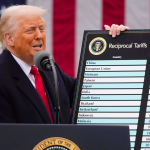In a dramatic move that sent shockwaves through global markets, former President Donald Trump launched a sweeping wave of tariffs in early April 2025, declaring a so-called “Liberation Day” for American industry. The newly announced trade policies include a blanket 10% tariff on all imports, with targeted rates reaching 34% on Chinese goods and 25% on foreign-made automobiles. The impact was immediate and severe.
Markets Tank in Response
Within hours of the announcement, the Dow Jones Industrial Average plunged more than 1,200 points—its steepest single-day drop since 2022. The S&P 500 fell by 3.4%, and the Nasdaq Composite plummeted over 4%, wiping out billions of dollars in market capitalization. Analysts described the selloff as a “panic wave,” with trading volumes spiking to their highest levels in over a year. Institutional investors led a broad retreat from equities, particularly in the tech and consumer discretionary sectors, which are heavily exposed to global supply chains and import costs.
Tech giants like Apple, Amazon, and Tesla saw their stock prices nosedive, driven by fears of rising costs and lower international demand. Analysts also warned that many U.S. firms could face margin compression if they are unable to pass tariff-related cost increases on to consumers.
Among the hardest-hit were:
Apple Inc. (AAPL): Shares fell 8.5%, resulting in a $250 billion loss in market value.
Amazon.com Inc. (AMZN): Dropped 10.7% in the days following the tariff announcement.
Tesla Inc. (TSLA): Fell after reporting a 13% drop in quarterly sales, its worst in nearly three years.
Microsoft Corp. (MSFT): Slid to a 15-month low of $375 by April 1, 2025.
Nvidia Corp. (NVDA): Declined more than 5% following the tariff shock.
Investors globally reeled as the tariffs rippled across every major exchange. European markets closed down more than 2%, while Asian markets tumbled overnight. Crude oil futures dropped nearly 5% as traders braced for a broader slowdown in economic activity.
Economic Fallout and Stagflation Fears
Economists were quick to warn of long-term damage. Barclays reportedly revised its Q4 2025 U.S. GDP forecast downward to -0.1%, and projected unemployment to rise to 4.6% by the end of the year. Financial analysts cited risks of stagflation—a mix of stagnant growth and rising inflation—as consumer goods and industrial materials face sharp price increases.
The tariffs have also drawn swift condemnation from global partners. The European Union threatened reciprocal tariffs on $50 billion worth of U.S. goods. China responded by suspending agricultural purchases and hinting at future actions targeting American tech exports.
Strategic Tensions: Trump Targets African Minerals
In a controversial move tied to the new trade regime, the Trump administration specifically targeted resource-rich African nations, including the Kingdom of Lesotho, with a 45% duty on rare earth exports. The justification? Trump cited “national security vulnerabilities” tied to mineral imports.
Critics argue this is an overt attempt to pressure African suppliers into exclusive deals—effectively strong-arming emerging economies to prioritize U.S. demand over global partnerships. Industry experts warn this could trigger political tensions across southern Africa, while further destabilizing global supply chains already under strain from tariffs on China and the EU.
Analysts fear these supply disruptions could reverberate across critical sectors like electric vehicles, wind turbines, and defense technologies, all of which rely heavily on rare earth materials. If suppliers retaliate or divert exports elsewhere, Western manufacturers may face both production delays and cost spikes.
Supernova Metals: A Resilient Outlier
Amid this volatile backdrop, few companies are managing to chart a positive course—but Supernova Metals Corp. (CSE:SUPR) stands out. Headquartered in Canada, Supernova is a resource exploration company focused on rare earth and energy-critical metals in North America and Africa.
Its key holdings include a large claim block in central Labrador near the Two Tom rare earth project and an equity stake in offshore licenses in Namibia’s Orange Basin. Most recently, Supernova initiated a National Instrument 51-101 report on its Namibian offshore license, indicating potential for long-term development.
While most stocks suffered in April’s market dive, Supernova held firm. As of March 31, 2025, its share price stood at $0.49—up from $0.09 just twelve months earlier, a 444% gain. With a 52-week high of $0.56, Supernova has bucked broader market trends thanks to strong investor confidence in critical mineral demand.
In a statement, Supernova CEO Sean McGrath said, “Global market turbulence reinforces the strategic importance of rare earths and energy metals. We believe Supernova is uniquely positioned to benefit from the supply realignments now underway.”
The Bigger Picture
Trump’s tariffs may appeal to a certain voter base, but their economic consequences are already proving costly. Between plummeting markets, rising consumer prices, and threats of global retaliation, the strategy risks dragging the U.S. into another recession. Businesses are pulling back investment, and job growth has started to slow.
Yet in every crisis lies opportunity. Supernova Metals demonstrates that nimble companies operating in strategic sectors can weather the storm—and perhaps even thrive.
As the dust settles from the “Liberation Day” shockwave, one thing is clear: we’re entering a new era of economic uncertainty. Whether more companies follow Supernova’s example or get swept away by policy turbulence will define the months to come.
Conclusion
Trump’s latest round of tariffs may have been framed as a bold play for economic independence, but the reality is proving far more chaotic. With global markets in retreat, trade tensions escalating, and inflationary pressures rising, these policies are reshaping the global economy—mostly for the worse. Investors are bracing for prolonged uncertainty, and consumers are already beginning to feel the sting of higher prices.
Still, amid the disarray, some companies are charting a different path. Supernova Metals (CSE:SUPR) is showing that resilience and strategic positioning in critical sectors can create opportunity where others see only risk. As the world adjusts to this new era of protectionism, adaptability may be the most valuable asset of all.





